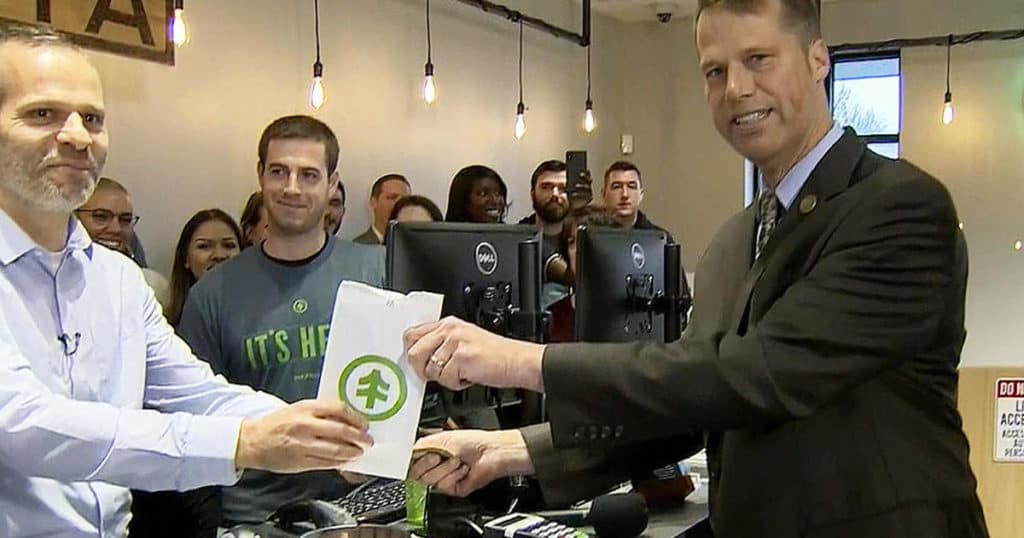
By Dan Murphy
As the State legislature and Gov. Andrew Cuomo delay their decision on whether to legalize the sale of marijuana in the Empire State, New Yorkers are not waiting for the outcome. Instead, they are traveling across the border to Massachusetts to purchase pot, edibles, and other varieties of cannabis in retail stores.
The argument by some groups in New York opposed to legalizing marijuana, that legalization will have detrimental health, public safety and societal impacts, is weakened if New Yorkers can travel by car for about an hour to find a state, and a location, that sells pot.
Under Massachusetts law, New Yorkers age 21 and older can buy legal weed, extracts and edibles at their dispensaries – even though pot’s still illegal in New York. And records show that more than 25,000 New Yorkers have traveled to buy pot in Massachusetts at several locations, the closest one being in Great Barrington, at Theory Wellness, which is less than a 2 hour drive from Westchester.
Half of the customers to Theory Wellness are from New York. Several New Yorkers interviewed at the store indicated that they made the trip because of the quality of the product, the different products available, and the fact that the pot and pot products sold legally are tested.
Massachusetts charges a 17 percent tax on all pot sales, and local governments add on another 3 percent tax. Estimates have the state collecting $200 million in sales tax on more than $1 billion in sales from marijuana dispensaries.
Ten other states have legalized Marijuana, with New York to become the 11th state if the governor, the Senate and Assembly can agree on a law by the end of June. If they don’t agree, then pot will remain illegal in New York until 2020.
Under Massachusetts law, dispensaries can sell up to 1 ounce of marijuana daily to customers 21 years of age or older. New Yorkers traveling from one of two nearby dispensaries across the border in Massachusetts, (the other location near the New York border is in Pittsfield) must realize that possession of marijuana is illegal in New York and it is still considered a Schedule 1 narcotic by the federal government.
Those traveling with marijuana purchased legally in Massachusetts should obey all traffic laws, drive safely, and wait until you get home to use what you purchased. New York State police and sheriffs located on the border are not pulling over vehicles randomly for suspicion of buying pot in Massachusetts.
Under current New York law, the possession of less than 25 grams of marijuana (just under 1 ounce) is a violation punishable by a fine of up to $100. Possession of between 25 grams and 2 ounces is a misdemeanor. Many county district attorneys in New York State are no longer prosecuting marijuana possession for small amounts.
Westchester District Attorney Anthony Scarpino has stopped prosecution for the possession of small amounts of marijuana, less than 25 grams. Scarpino, in his comments about the change by his office, pointed to the other argument in the debate over legalizing marijuana-the uneven prosecution of persons of color for pot possession. Scarpino said the changed are “illustrations of our commitment to a fairer system of justice that works for every member of our community, no matter where they live, the color of their skin, or the amount in their wallets.”
According to data collected by the Massachusetts dispensaries, half of their customers are between the ages of 25 and 47, with two times more men purchasing marijuana than women, and their locations in New York vary from Jamestown near Buffalo, to Massena to Brooklyn.
Cuomo, who proposed the legalization and sale of marijuana, said after the budget agreement did not include legal pot: “The political desire is there, I believe we will get it done… It is complicated to come up with a program that does it and protects public safety, and does economic empowerment for communities that have paid the price. And the best way to do it was not in the race of the budget. And that is nothing new – we’ve been talking about it for weeks. But that’s the one item on the list that we did not get to yet.”
Theory Wellness CEO Brandon Pollock said “product variety ” is the reason New Yorkers are buying at his stores by the thousands. “You can’t have anywhere near as extensive a menu when you’re getting it delivered in New York City,” he said. “We have tons of products that are a draw — you can get a little flower, a pre-roll, a vaporizer, and an edible.”
What does the interest by New Yorkers and by customers all over the Northeast in his store point to? “It shows that people all over the country, not just Massachusetts, consume cannabis and they want to purchase it from a regulated store where they can get a safe, tested, known product,” said Pollock, who predicted that federal legalization is coming in the next two to four years.
While state legislators and the governor decide on legalization in New York, the sale of marijuana can be restricted in Westchester if county government decides to “opt-out” of permitting the sale of pot, or if the City of Yonkers also decides to do so. Several other local towns and villages are also debating whether to restrict the locations in their communities where marijuana can be sold if it is legalized by the state.
County Executive George Latimer is taking a wait and see approach for now. “We need to wait and see what becomes law, and in what form,” he said, when asked earlier this year. “The issue is being intensely debated in the community at large with both pro and con arguments. Should the measure pass this year, and should a county opt-out provision be included in the law, our administration and the Board of Legislators will meet to determine how to handle our role in this matter. Until then, we welcome all opinions and arguments on either side, as befits our policy of inclusion of all public input,” said Latimer.
Several local chapters of national organizations, like N.O.R.M.L. and the Westchester Coalition for Police Reform, continue to advocate for legalization. Other groups, like Smart Approaches to Marijuana New York, have presented a coalition of medical professions, addiction treatment specialists, parents, and concerned New Yorkers, to try and put the brakes on legalization efforts in NY.
Their efforts appear to have worked in the short term, with legalization not included in the state budget bill as originally requested by the Governor.
” As you well know, states that have welcomed commercial weed have seen significant impacts on public health and safety, underperformance in tax revenue and little meaningful social justice reforms. Counties across New York, including neighboring counties of Putnam and Rockland, have already expressed opposition to commercial pot sales in their communities and lobbying by Big Marijuana continues to increase the likelihood that the state’s market would be dominated by an industry with a history of victimizing low-income and minority communities,” said Bob Driscoll, SAM-NY.





